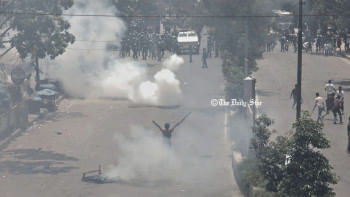A fifteen-year-old wait
Fifteen years is a long time to wait for justice, to hope for it. Fifteen years is a long time for a country to deny its people reparation, peace of mind, a feeling of belonging. It is a long time for one political party to get away with orchestrated violence, and for another, to reap the spoils of it, using it as "bait" to win elections.
Fifteen years is a long time to cling on to the aspiration of a pluralist Bangladesh.
Fifteen years and we seem to have all but forgotten that, in 2001, right after the BNP-Jamaat alliance came to power, there was a systematic backlash against the Hindu community, who are generally thought to be the "vote bank" of the Awami League. In the worst incidents of communal violence in independent Bangladesh, tens of thousands of Hindu households were rampaged and their property looted, temples were desecrated and set on fire, Hindus were mentally and physically assaulted, even murdered, and Hindu women were raped all around the country. The worst affected areas were in Barisal, Bhola, parts of Pirojpur, Khulna, Satkhira, Gopalganj, Bagerhat, Jessore, Commilla and Narsingdi. Hundreds of Hindu families, fearing further attacks, fled across the border into India. Not surprisingly, many of them have not returned, too afraid to come back to the country that never quite thought of them as its own.
According to eye-witness accounts, media reports at the time and field investigations of different rights-groups and concerned individuals, the attackers were mostly supporters of the BNP-Jamaat alliance. The complicity of the law enforcement agencies and local administration were, in many cases, explicit, and in others, implicit.
Predictably enough, the then government not only denied its own involvement in the violence, but also that such incidents had taken place. The Home Minister at the time, Altaf Hossain Chowdhury, even claimed that the attacks were "baseless, exaggerated and politically motivated". In the face of widespread national and international outcries, the government was forced to admit that some incidents of violence had taken place, but made no comments about its scale or name the perpetrators.
On November 8, Khaleda Zia formed a secretarial committee to investigate the attacks on members of the minority community across the country and report within a week. It was, however, not an independent committee, for it was headed by Kamaluddin Siddiqui, the principal secretary to the Prime Minister, and supervised by the Home Minister himself – a man who, interestingly enough, was named as a perpetrator of violence in the judicial commission probe in 2011.
With the government itself disavowing the extent of the violence, it is hardly a surprise that not much progress was made in ensuring justice for the victims during the BNP regime. In many cases, the perpetrators were protected by their privilege, access to and power over local administration, which meant that even if and when cases were filed, investigations took place in a thoroughly biased manner (if they took place at all, that is). Many rights organisations, too, backed off from filing cases on behalf of the victims for fear of backlash against them; they were also afraid that if they filed cases under the ruling government, the verdicts would go against the victims.
What is surprising, however, is the lack of any real attention the issue has garnered since the BNP regime. Sure, the AL has been all too apt to point fingers at the BNP-Jamaat for perpetrating the post-election violence when it suits their agenda – and to highlight themselves as a pro-minority party to garner votes – but seven years on, how close are we to bringing the criminals to justice in a systematic manner?
In 2009, the High Court ordered the government to form a commission and launch an inquiry into the violence after the 2001 general elections. The victims of the crimes, their family members and witnesses gave depositions to the commission, which found the involvement of 26,352 people, including 25 ministers and lawmakers of the previous BNP-Jamaat alliance government, in the 2001 post-polls violence. The report, however, was never made public, despite repeated appeals from vested quarters.
According to media reports, the commission recommended bringing the people involved in post-polls violence in 2001 under trial, filing cases against the accused and restoring the cases withdrawn in political consideration. The judicial commission also recommended the formation of short-term investigation committees or investigation commissions at district level involving additional district magistrate, additional police and an executive magistrate to investigate the incidents of political violence and attacks on minority communities, and setting up a monitoring cell at the Home Ministry to coordinate the tasks of the probe bodies. Unfortunately, none of these recommendations have thus far been implemented.
Seven months after the commission filed its report in April 2011, the then Home Minister Sahara Khatun briefed reporters about the findings. She stated that the government would help victims file lawsuits against people alleged to have been involved in the crimes. If the victims were afraid to file the cases, the government would do so on their behalf. She also promised to help the victims financially according to government capacity, as the report had stated that many victims had sought financial help from it.
These were laudable promises, no doubt, and if fulfilled, could go a long way towards ensuring some form of reparation to the aggrieved community. Better late than never, after all. Unfortunately, however, these promises got buried under that never-ending list of pledges made by the government to its people… buried deep and deeper still under lofty promises of bringing peace and order, restoring democracy, ensuring social justice, protecting human rights…
Then came another [threat of an] election, and with it, another series of attacks on the Hindu community. The AL lost no time in capitalising on the violence against minorities; it helped sell their image as the secular party, after all. Even if we hold BNP-Jamaat to blame (for there were allegations to the contrary), why, we wonder, did the government fail to give due protection to the minority communities this time, given that they had ample notice that Hindus might come under attack, and when the Chief Election Commissioner himself had assured, shortly after the election schedule was published in November 2013, that there would be no repetition of the 2001 atrocities? And beyond the inevitable political blame-game, how many cases were filed and investigations conducted in a free and fair manner? What efforts were given to rebuild the confidence of the affected communities?
With the AL in power, it was hoped that violence against minority communities would go down significantly. It is distressing to see perpetrators of communal violence being given free reign during its regime, and land grabbing of Hindus and associated violence going on unabated in many parts of the country, allegedly under the patronage of AL-backed cadres and local elites. It is easy enough to blame the BNP-Jamaat for all atrocities against the Hindus, and easier still, for "secular" and "pro-minority" party men to hide under the AL's cloak of so-called pluralism.
Fifteen years of disavowal and delayed promises later, we must confront the uncomfortable truth that beyond paying lip-service to the "ideals of secularism and tolerance" (if that!), we have done precious little to show we care about the Hindu population of this country, be it through our everyday practices or institutional structures. The statistics speak for themselves: from 25 percent of the total population in 1971, Hindus are now down to just 9.2 percent. If we cannot end the culture of guaranteed impunity to land grabbers, rapists and instigators of violence, and challenge the normalisation of violence and discrimination against Hindus, we may as well admit that the idea of a pluralist Bangladesh is a fantasy at best and a farce at worst.
The writer is a journalist and activist.

 For all latest news, follow The Daily Star's Google News channel.
For all latest news, follow The Daily Star's Google News channel. 



Comments